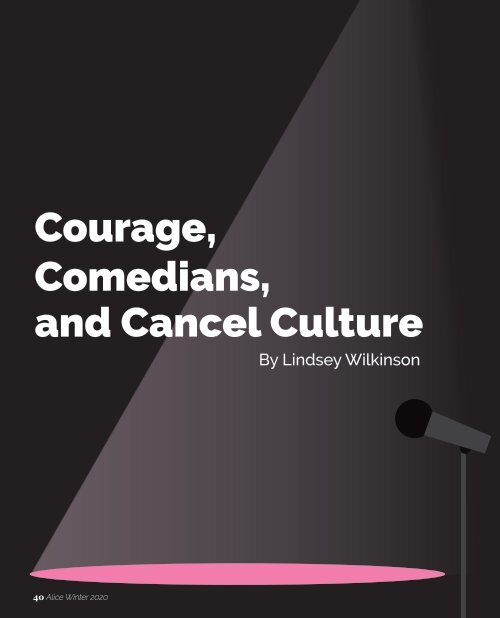Alice Vol. 5 No. 1
Published by UA Student Media in Fall 2019.
Published by UA Student Media in Fall 2019.
You also want an ePaper? Increase the reach of your titles
YUMPU automatically turns print PDFs into web optimized ePapers that Google loves.
Courage,<br />
Comedians,<br />
and Cancel Culture<br />
By Lindsey Wilkinson<br />
Turning controversy into comedy can cause an<br />
uproar, but one thing is for sure: Comedians will not be<br />
silenced. Comedy is looked at by many as a safe place,<br />
because everyone can be turned into a punchline.<br />
Comedy isn’t exclusively about the laughs; it’s about<br />
the struggles, misfortunes, and every day bumps in the<br />
road.<br />
While comedy is always around to make us laugh,<br />
there seems to be a recent renewal with the help of<br />
streaming services like Hulu, Netflix, and YouTube that<br />
allow comics to expand their audience.<br />
UA alumna and comedian Hannah Widener said<br />
that the increase in streaming services has decreased<br />
the cutthroat, competitive nature of the business.<br />
“More opportunities are available for comedians,”<br />
Widener said. “Twenty or thirty years ago your success<br />
would be judged by if you landed on a sitcom or<br />
landed a late night spot. These limited spots created a<br />
competition and heightened animosity between comics<br />
[...]There are just so many more avenues, and there is a<br />
spot for everyone. Comedians can see that I can create<br />
my own path and my own way in this industry, and it<br />
doesn’t mean that your success is my loss.”<br />
While the services broaden the horizons for<br />
comedians, there are still some drawbacks. Most of<br />
these services promote content based on what has been<br />
previously watched. In this aspect, these services can<br />
still be limiting.<br />
“If a comedian does a special on Hulu, you might<br />
not see it. So people — in particular Iliza Shlesinger<br />
— had a Netflix special when Netflix was just getting<br />
started. At that time when you researched female<br />
comedians on the platform you might see three or four<br />
women. Whereas today, while Iliza Shlesinger is super<br />
famous now, I don’t know if you would see her on the<br />
platform because there are just so many people.”<br />
Another obstacle for all comedians is the recent<br />
explosion of cancel culture. The definition of cancel<br />
culture, according to Merriam-Webster dictionary is<br />
that it “refers to the removal of public support of public<br />
figures on the basis of their objectionable opinions or<br />
actions.” Most comedians follow the golden rule to<br />
never apologize for a joke, but that doesn’t mean they<br />
don’t catch backlash for their content. Kathy Griffin<br />
shared a photo a few years back that resulted in her<br />
unemployment. Agents wouldn’t keep her, networks<br />
wouldn’t greenlight her shows, but that didn’t stop her.<br />
Using her own funds, she booked venues and toured,<br />
promoting the concept that free speech could not be<br />
silenced.<br />
“Kathy Griffin has been a huge inspiration in<br />
the past few years in terms of fighting for speech and<br />
fighting for the right to say what you want to on stage,”<br />
Widener said. “She is a huge example of being knocked<br />
down and rising from the ashes.”<br />
Widener went on to explain cancel culture’s role in<br />
the industry, explaining its possible negative effects on<br />
free speech.<br />
“Silencing comedians will do no one any good,”<br />
she said. “At the end of the day, we are here to create<br />
entertainment. You may not like it, you may not<br />
agree with it, but you can learn from it. You can’t just<br />
shut people up. If you silence that person, you aren’t<br />
learning from them. You are casting them off. They will<br />
not disappear because you blocked them on Twitter.<br />
Cancel culture perpetuates silence, and we have to<br />
stop.”<br />
Cancel culture can be a daunting obstacle for<br />
comedians, especially in regards to speaking on<br />
difficult topics. When asked about navigating these<br />
treacherous waters, Widener described her experience.<br />
“I’ve talked about my sexual assault, and it is very<br />
difficult to talk about that on stage,” Widener said.<br />
“There is a line. The intention of a comic is never to<br />
be malicious, so when you are talking about a topic<br />
like sexual assault, you tread lightly. You want them<br />
to root for you, and you want them to laugh with you.<br />
You want to take some of their pain away. That is all<br />
you can do at the end of the day — is laugh. Laugh,<br />
especially at some of the horrible things that happen<br />
in the world, because that is the only way you will get<br />
through them.”<br />
40 <strong>Alice</strong> Winter 2020<br />
<strong>Alice</strong> Winter 2020 41


















